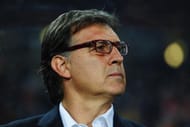Gerardo Martino agreed a two-year deal with Barcelona and takes over from Tito Vilanova. (Getty Images)
Gerardo ‘Tata’ Martino may not be a household name in Europe, but only a privileged few have the honour of being the disciples of Marcelo Bielsa; and mind you, that list isn’t awfully long.
50-year-old Martino was appointed the new Barcelona head coach after agreeing a two-year deal, following the resignation of 44-year-old Tito Vilanova, who experienced a relapse of throat cancer he had first suffered in 2011.
Like Martino, Barcelona’s former manager Pep Guardiola – who is the current head coach of treble winners Bayern Munich – looked up to Bielsa and made his principles the basic tenets of his trophy-laden four years in Catalonia, which included a sextuple in 2009.
There is more than what meets the eye between the number one protégé Tata, and his pedagogue El Loco (the Mad One), as their frightening similarity goes well beyond the tactics board.
Apart from the fact that they both preach bielsismo (clearly coined after the impact Bielsa has had on the game) – a high-pressing, possession-based attacking philosophy – they sport a tousled side-parted mullet of sorts and a set of thick frames, which are fairly academic in nature.
The duo goes back a long way, a little over two decades to be precise. Martino, the player, was a vital cog of Bielsa’s Newell’s Old Boys midfield (that featured another one of his adherents, current Southampton manager, Mauricio Pochettino), which reached the the final of the 1992 Copa Libertadores, South America’s premier club competition.
A year earlier in 1991, Bielsa led them to the Apertura (Spring Championship) and overall championship in the days when the winners of Apertura and Clausura (Fall Championship) played-off. They also won the Apertura in 1991-92 when the winners didn’t meet in a play-off (and both Newell’s Old Boys and River Plate were awarded the title of champion).
Today, 20 teams in the Argentine Primera División play two single round-robin tournaments each year: the Torneo Inicial, from August to December and the Torneo Final, from February to June. The winners face-off to determine the champion of the season, unlike the Apertura and Clausura seasons that proclaimed a champion each.
Under the guidance of their most capped player – Martino represented Newell’s a total of 505 times – the Rosario-based outfit won the 2013 Torneo Final but lost out to 2012 Torneo Inicial winners Vélez Sarsfield in the 2012-13 Superfinal.
Real Sociedad and Málaga approached Martino about taking over as manager this season, only for him to turn them both down as Newell’s were still competing in the Copa Libertadores.
Martino led a team which was fighting against relegation just a year ago, to the semi-finals of the Liberatadores, where they were knocked out in a penalty shoot-out by Ronaldinho’s Atletico Mineiro in Brazil.

50-year-old Martino led Newell’s Old Boys to the semi-finals of the Copa Liberatadores, where they were knocked out by Brazil’s Atletico Mineiro. (Getty Images)
Like his mentor, Martino is adored by the fans and has a stand named after him at the home ground. Bielsa is a legend in Rosario, so much so that the Newell’s stadium was renamed after him in 2009.
Martino began coaching in 1998, and Barcelona will be his tenth club in 15 years. His biggest achievements to date are leading the Paraguayan national team to the quarterfinals of the 2010 World Cup and taking them to the final of the Copa America in 2011.
In the last eight of the World Cup in South Africa, Iker Casillas saved an Oscar Cardozo penalty with the score tied at nil-nil. Spain’s all-time leading scorer David Villa then netted a late goal to secure a hard-fought 1-0 triumph for the eventual world champions.
The 2011 Copa America final in Argentina saw 2010 World Cup Golden Ball winner, Diego Forlan score a brace to inspire Uruguay to a 3-0 win. Luis Suarez scored the opener in a rather one-sided affair. Martino stepped down as the head coach at the end of the tournament.
Prior to his one year spell back home with Newell’s, Martino hasn’t actually taken charge of a club since 2006, though he did win three Paraguayan titles – across two spells – at Lidertad. And for someone who has never managed in Europe, getting used to managing a club with the expectations of Barcelona under the constant watchful eye of the media will not be an easy task.
By appointing Martino, the Barcelona board has broken its tradition of promoting from within the ranks or in keeping with its Dutch identity from the time of Johan Cruyff, Louis Van Gaal or Frank Rijkaard.
Martino is cut from the same cloth as Guardiola or Vilanova. With his style of play he will prove a perfect fit in Barcelona’s core tiki-taka values. The only change he would have to make is to try and accommodate new signing Neymar alongside countryman Lionel Messi.
In the four-time Ballon d’Or winner, Martino has a confidant in the dressing room; as he was his hand-picked favourite for the job. Messi, like his new manager, was born in Rosario and played for Newell’s as a child in the youth system.
Martino may be unheard of but is the most logical choice of all, being a bielsista. And we can expect little to change at Camp Nou, as he advocates the same school of thought of his predecessors.
As an outsider, the expectations will probably be higher, but Tata has all the essentials needed to succeed at Blaugrana. It is rather invigorating that a club like Barca are getting creative rather than pursuing a big name.
